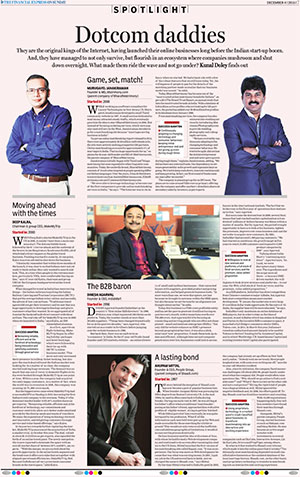The B2B baron
DINESH Agarwal founded IndiaMART as the country’s “first online B2B directory” in 1996. Within a year, it had registered 100 clients on its platform. Today, the number stands at more than 26 lakh suppliers. “Things have changed dramatically for us in the past two decades,” says Agarwal, who started out as a trader in fertilisers before jumping onto the website business in 1996.
But back then, there was no such term as ‘e-commerce’ in India. So the 47-year-old Noida-based founder and CEO started a website—an online directory of small and medium businesses—that connected buyers with suppliers, provided product and pricing information, and helped generate business leads. “In more ways than one, we were disruptors, not just because we brought in newness within the SME space, but also because we set the tone for an alignment not thought about earlier,” he adds.
Today, this business is a R300-crore profitable entity and has set the pace to generate 10 million buying enquiries every month, with transactions worth over R30,000 crore. And Agarwal did it by focusing on connecting and serving people who are often not championed—small and medium enterprises (SMEs). “Not only did the website enhance an SME’s presence beyond geographical barriers, it was also a slick, smart and ‘now’ proposition. It made them look up-to-date and efficient. Although Internet and computer penetration were low, businesses could look to access buyers in the international markets. The fact that we broke even in the first year of operations bore testimony to this,” says Agarwal.
But soon came the dotcom bust in 2000; several businesses that had reached market capitalisation in hundreds of millions of dollars became worthless within a matter of months. But for Agarwal, the period brought opportunity to have a re-look at his business, tighten the processes, improve cost-consciousness and cast the net wider to acquire new customers. By 2001, IndiaMART had around 1,000 paying customers. “We had charted an ambitious 10x growth target in five years to reach 10,000 customers and expand to 5,000 product categories by 2006”, says Agarwal.
Talking about IndiaMART’s “continuing existence”, Agarwal says, “As I said, we were disruptors many times over. The ingredients and the scope were all there—a buoyant SME-driven market; the willingness to look at new avenues and platforms—in our case, the Web; a full stack of fresh services; and the premium, value-added proposition.”
As a B2B platform, IndiaMART has direct competition from Chinese e-commerce major Alibaba, but Agarwal feels more competition means more market development. “If you see, the market size is very large. It’s a trillion-dollar trade opportunity. By the entry of Alibaba, the supplier base will be more educated,” he says.
IndiaMART only maintains an online database of B2B players, but in order to take on the likes of Amazon.in and Alibaba (which has stakes in Snapdeal and Paytm) in the lucrative B2B e-commerce space, it launched a full-fledge e-commerce site for SMEs, Tolexo.com, in 2014. In March this year, IndiaMART raised an undisclosed amount (largely to be used for Tolexo) in Series C funding led by Amadeus Capital, and in which Westbridge, UK-based Quona Capital and existing investor Intel Capital also participated.


